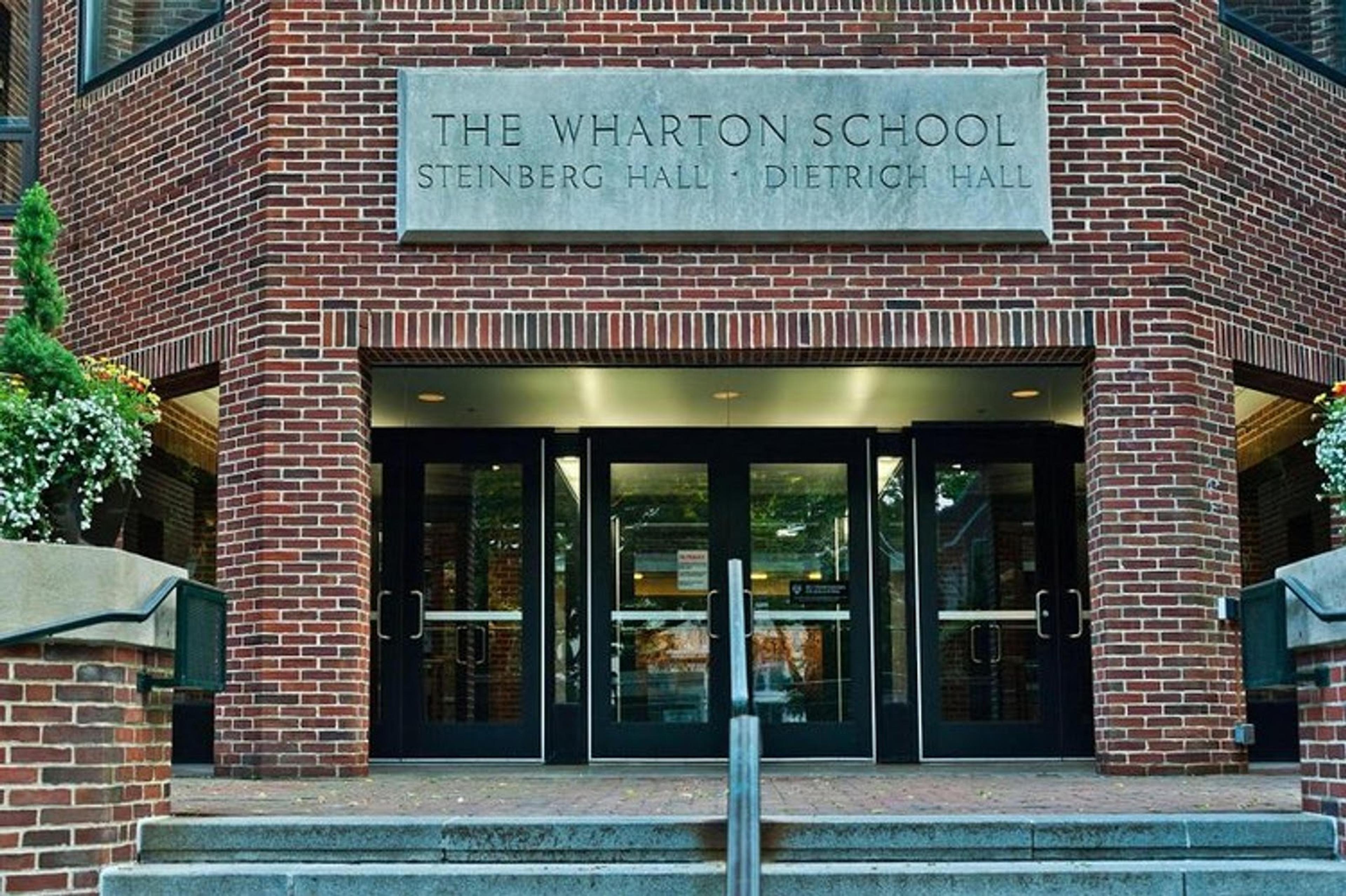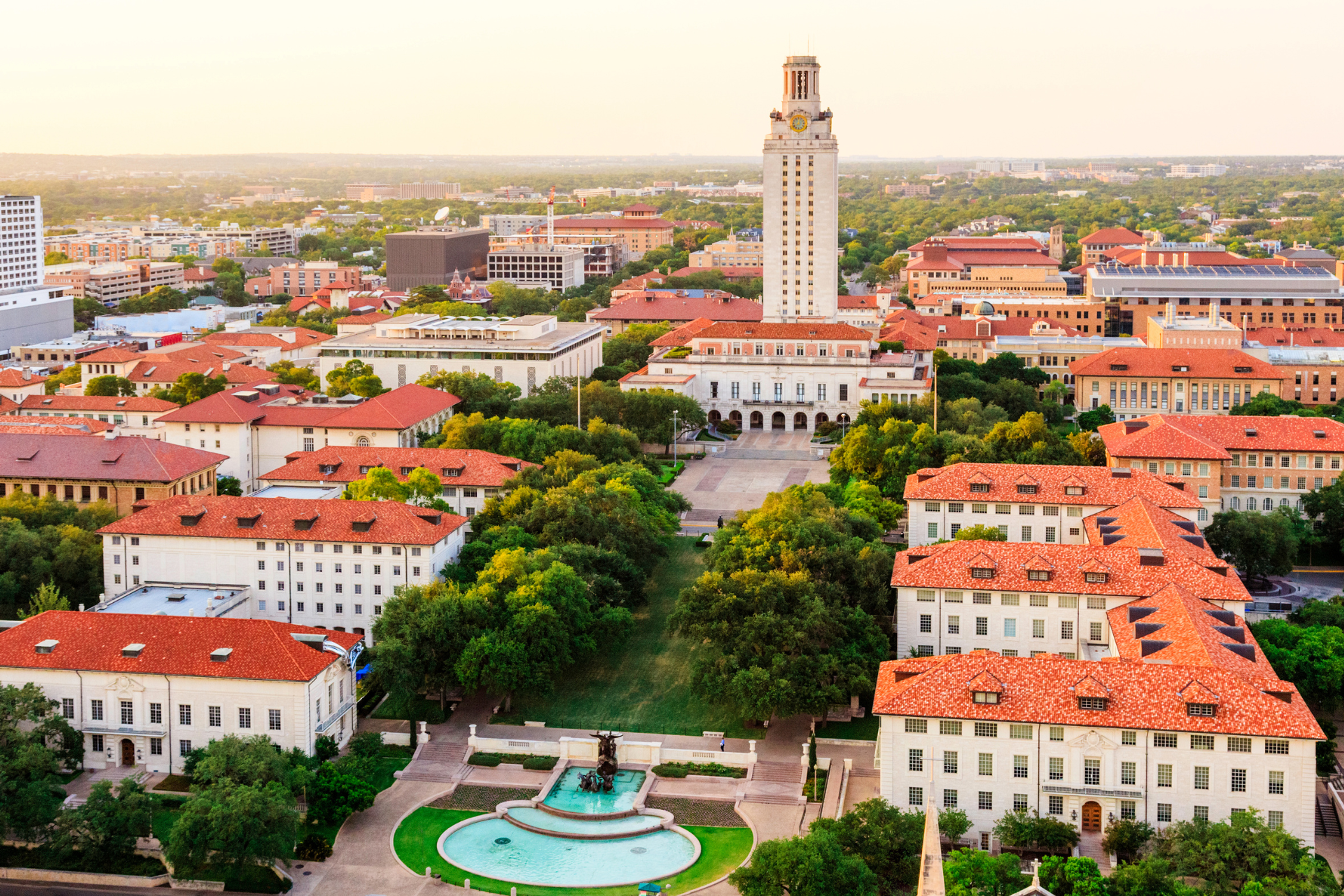The Wharton School MBA: Acceptance Rate, Deadlines, Cost, Requirements, & Program Overview
Perfect your MBA Application with this guide curated by the best MBA admissions coaches in the world on how to navigate the application process and get into the Wharton MBA program.
Posted July 2, 2025

Table of Contents
Free Event

Featuring Horatiu S.
Profile Power: A LinkedIn Profile That Gets You In
Starting Tuesday, September 2
11:00 PM UTC · 45 minutes

Featuring Horatiu S.
Wharton MBA Program Overview (2025)
Founded in 1881, the Wharton School at the University of Pennsylvania is one of the oldest and most prestigious business schools in the world. Located in Philadelphia, Pennsylvania, Wharton is renowned for its rigorous curriculum, influential faculty, and vast alumni network. The full-time MBA program is consistently ranked among the top business programs globally, offering a data-driven approach to business education with a strong emphasis on leadership, entrepreneurship, and finance.
Wharton’s MBA Program offers intensive but flexible core courses in business management. With 19 majors and nearly 200 electives, you can effectively create your own program by choosing your own subjects centered around the core subjects. Wharton also places a premium on teamwork; admitted students will find themselves on a large number of collaborative teams during their academic experience.
Wharton MBA Acceptance Rate
The acceptance rate for the Wharton School’s MBA program varies slightly depending on the source and the specific class year. For the Class of 2025, the acceptance rate was approximately 25%, with 874 students enrolled out of 6,194 applicants. Other sources report acceptance rates around 24.8% for recent classes. These figures indicate that Wharton is highly selective, though its acceptance rate is slightly higher compared to some peer institutions like Harvard Business School and Stanford Graduate School of Business.
For the Class of 2026, Wharton received 7,322 applications and enrolled a class size of 866 students. While the exact acceptance rate for this class isn't specified in the available data, these numbers suggest a competitive admissions process consistent with previous years.
Applicants to Wharton's MBA program are evaluated on various factors, including academic performance (average GPA of 3.6), standardized test scores (average GMAT score of 728), professional experience (average of 5 years), and leadership potential. The school also values diversity, with recent classes comprising students from various industries and backgrounds.
Wharton MBA Class Profile (Class of 2025)
- Location: Philadelphia, PA
- Class Size: 874
- Number of Applicants: 6,194
- Acceptance Rate: 14%
- Average Work Experience: 5 years
- Average GMAT: 728
- Average GRE: 162 Verbal, 162 Quant
- Average GPA: 3.6
- Women: 50%
- International Students: 31%
- LGBTQ+: 11%
- First-Generation Students: 11%
- White: 27%
- Asian American: 21%
- Black/African American: 9%
- Hispanic/Latinx: 7%
- Military Students: 6%
Wharton School MBA Cost — Tuition & Fees
First-Year Budget (2024–2025):
| Expense | Amount |
|---|---|
| Tuition | $84,830 |
| University Fees | $4,670 |
| Living Expenses | $33,804 |
| Health Insurance | $4,412 |
| Total | $127,716 |
Second-Year Budget (2024–2025):
| Expense | Amount |
|---|---|
| Tuition | $83,830 |
| University Fees | $4,670 |
| Living Expenses | $33,804 |
| Health Insurance | $4,412 |
| Total | $126,716 |
Read: Wharton MBA Tuition & Fees Breakdown
Wharton School MBA Employment Report
Employment Overview
- Total Graduates: 916
- Students Seeking Employment: 634 (69.2%)
- Job Offers Received (within three months): 93.1%
- Job Acceptances (within three months): 88.2%
Industry Placement
- Financial Services (36.6%)
- Investment Banking/Brokerage: 15.2% ($175,000)
- Private Equity/Buyouts/Other: 10.0% ($175,000)
- Investment Management: 4.8% ($170,000)
- Venture Capital: 3.4% ($200,000)
- Consulting (25.2%) – Median Salary: $190,000
- Technology (14.1%) – Median Salary: $162,750
- Healthcare (5.0%) – Median Salary: $163,000
- Media, Entertainment & Sports (3.0%) – Median Salary: $140,000
- Real Estate (2.0%) – Median Salary: $150,000
- Social Impact (2.7%) – Median Salary: $120,000
Function Placement
- Consulting/Strategy (33.1%) – Median Salary: $190,000
- Investment Banking (15.0%) – Median Salary: $180,000
- Private Equity/Venture Capital (12.9%) – Median Salary: $153,750
- Product Management (7.0%) – Median Salary: $150,000
- Investment Management/Portfolio (5.0%) – Median Salary: $225,000
- General/Project Management (7.0%) – Salary data not specified
Geographic Placement
- United States (94%) – Median Salary: $175,000
- Northeast: 46.8% ($175,000)
- West: 21.5% ($175,000)
- Mid-Atlantic: 12.0% ($175,000)
- Southwest: 5.0% ($192,000)
- South: 4.7% ($175,000)
- Midwest: 3.6% ($189,000)
- International (6%) – Median Salary: $134,826
- Asia: 3.9% ($150,000)
- Europe: 1.6% ($119,052)
Top Employers
- Accenture Strategy
- Amazon
- American Express
- Bain & Company
- Boston Consulting Group (BCG)
- Citigroup
- Deloitte Consulting
- Goldman Sachs
- J.P. Morgan
- McKinsey & Company
- Morgan Stanley
""Wharton MBAs reap the benefits of engagement within our diverse community, leading to innovative ideas and solutions for the world’s next problem in business.""
Wharton Admissions

Wharton MBA Program Overview
Wharton MBA Program & Degrees
- Traditional, Full-Time MBA – A two-year, full-time program designed for early- to mid-career professionals looking to accelerate their careers or pivot industries.
- Executive MBA – A flexible, weekend-based program designed for working professionals with significant leadership experience, offering classes in Philadelphia, San Francisco, and the Global cohort.
- Deferred MBA – The Moelis Advance Access Program, which allows undergraduate and master’s students to secure a spot in Wharton’s MBA program and enroll after gaining 2-4 years of professional experience.
- Joint Degrees – Wharton offers several interdisciplinary dual-degree programs, including:
- JD/MBA (Penn Law) – A three-year program combining business and law education.
- MBA/MA Lauder Joint Degree – A program integrating international studies and business.
- MBA in Health Care Management – A specialized program focused on the healthcare industry.
- Other Dual Degrees – Wharton partners with Penn Engineering, Medicine, Nursing, Education, and other schools to offer unique interdisciplinary programs.
Wharton MBA Application Deadlines
| Round | Deadline |
|---|---|
| Round 1 | September 4, 2024 |
| Round 2 | January 3, 2025 |
| Round 3 | April 2, 2025 |
| Deferred | April 23, 2025 |
See more info on the recently released deadlines here: Wharton MBA Application Deadlines (2024-2025)
Wharton MBA Requirements
Application Checklist:
- GMAT/GRE Score – Wharton accepts both the GMAT and the GRE with no preference for either. International students who have not completed a degree at an institution where English is the language of instruction must also submit a TOEFL, PTE, or IELTS score.
- Transcripts – Unofficial copies of undergraduate and graduate transcripts must be uploaded with the application.
- Essays – Two required essays focusing on career goals and contributions to Wharton, plus an additional essay for reapplicants.
- Letters of Recommendation – Two professional letters are required, preferably from a current or former supervisor.
- Interview – By invitation only, Wharton’s interview includes a Team-Based Discussion (TBD) and a one-on-one session.
- Resume – A one-page resume highlighting work experience, leadership, and achievements.
- Application Fee – A $275 non-refundable fee ($100 for the deferred MBA program).
- Wharton MBA Essays – Wharton uses its essays to get to know you on a professional and personal level. You should be introspective, candid, succinct, and, most importantly, yourself. Both essays are mandatory and the prompts are as follows:
- Essay 1 – How do you plan to use the Wharton MBA program to help you achieve your future professional goals? You might consider your past experience, short and long-term goals, and resources available at Wharton. (500 words)
- Essay 2 – Taking into consideration your background – personal, professional, and/or academic – how do you plan to make specific, meaningful contributions to the Wharton community? (400 words)
- Reapplicants must submit an additional essay – Please use this space to share with the Admissions Committee how you have reflected and grown since your previous application and discuss any relevant updates to your candidacy (e.g., changes in your professional life, additional coursework, and extracurricular/volunteer engagements). (250 words)
- Wharton MBA Interview: Once you’ve submitted your application, you may be invited for an interview. An interview is a strong indicator of interest from the school, but of course, it’s not a guarantee of admission. Interviews for the Wharton MBA program are by invitation only. If you are invited, you will participate in Wharton’s Team-Based Discussion (TBD). Some tips to remember during the interview are to showcase your personal skills and strengths, your adaptability in terms of working with groups, be yourself, and of course, relax! You were invited to interview for a reason!
- Wharton School Letters of Recommendation: Wharton requires two letters of recommendation from people well acquainted with your work performance, preferably from a current or former supervisor. Letters of Recommendation are split into two sections:
- The first is a selection of positive personality characteristics. Your recommenders will be asked to choose three characteristics from a list of ten that best describe you.
- The second is composed of two free-form questions: Question 1: Please provide example(s) that illustrate why you believe this candidate will contribute meaningfully to the Wharton MBA community. (300 words) and Question 2: Please provide example(s) that illustrate why you believe this candidate will find success throughout their career. (300 words)
Click here for our free Leland Recommender Prep Template.

Wharton School MBA Curriculum & Class Structure
The Wharton MBA curriculum is designed to provide both foundational business knowledge and flexible learning opportunities. The program consists of a core curriculum that covers essential business disciplines and a wide range of electives that allow students to specialize in their areas of interest. Wharton places a strong emphasis on leadership, analytics, and global perspectives, ensuring that Wharton MBA students are prepared for a diverse range of career paths.
Year 1
- Fixed Core Courses – These cover essential business foundations such as leadership, marketing, finance, and analytics.
- Flexible Core Courses – Students can tailor their studies by choosing from different course options in areas such as accounting, operations, and macroeconomics.
- Learning Teams & Cohorts – Students are placed into Learning Teams (5-6 students) and Cohorts (about 70 students) to foster collaboration.
- Global Experiences – First-year students can participate in Global Modular Courses (GMCs) or the Global Immersion Program (GIP) for international business exposure.
- Major Selection – Students begin to choose one or two majors from Wharton’s 21 different concentrations.
Year 2
- Electives & Major Focus – Second-year students take elective courses based on their chosen major(s) and career interests.
- Capstone & Experiential Learning – Many students participate in Leadership Ventures, consulting projects, and entrepreneurial programs to gain hands-on experience.
- Global Opportunities – Students can take part in study-abroad programs, dual-degree programs, or additional global business courses.
- Networking & Career Focus – The second year is critical for job placements, networking with Wharton alumni, and taking advantage of Wharton’s vast career resources.
How to Get Into Wharton School (2025)
1. Demonstrate Leadership & Impact
Wharton seeks candidates who have made meaningful contributions in their careers, extracurricular activities, or entrepreneurial ventures. Leadership at Wharton isn’t just about managing a team—it’s about driving change, influencing decisions, and spearheading initiatives. Applicants should highlight specific examples where they took initiative, led teams, solved complex problems, or influenced key stakeholders.
The best applications showcase measurable impact, such as increased efficiency, financial growth, or improved team dynamics. If you lack formal leadership experience, emphasize leadership in community service, nonprofit involvement, or entrepreneurial endeavors. For instance, if you launched a diversity initiative that led to policy changes at your company, describe how you identified the problem, implemented the solution, and measured the results.
2. Strong GMAT/GRE & Academic Performance
A strong academic record and competitive test scores are key factors in Wharton’s admissions process. The most recent class had an average GMAT score of 728 and a 3.6 average GPA. If your GPA is below average, use the optional essay to address extenuating circumstances and highlight rigorous coursework or professional achievements that demonstrate your ability to handle Wharton’s academic intensity.
If your GMAT/GRE score is low, consider retaking the exam or taking quantitative coursework like MBA Math or CFA exams to strengthen your profile. Wharton values academic rigor and resilience, so applicants should highlight challenging coursework, thesis research, or projects that required critical thinking and problem-solving skills. If you faced academic struggles, focus on how you adapted, improved, and ultimately succeeded.
3. Craft a Compelling Story
Wharton’s application essays and recommendations should tell a cohesive, authentic story that connects your professional backgrounds, motivations, and goals. Admissions team officers want to understand why you want an MBA, why now, and why Wharton specifically. Your application should clearly link your past experiences to your future aspirations, demonstrating how an MBA from Wharton is essential to your career trajectory. Authenticity is key—avoid generic statements and instead highlight personal experiences that shaped your goals.
Strong applications also show deep research into Wharton’s specific resources, such as professors, clubs, and leadership programs, and explain how they align with your career ambitions. Recommendations should reinforce your strengths, leadership abilities, and growth potential rather than offering generic praise. For example, if your goal is to transition from investment banking to impact investing, explain how Wharton’s ESG-focused curriculum, student investment funds, and strong finance network will support your career pivot.
Wharton School MBA Notable Alumni & Faculty
Alumni
- Elon Musk – CEO of Tesla and SpaceX, known for revolutionizing multiple industries.
- Donald Trump – 45th President of the United States and former real estate mogul.
- Alex Gorsky – Former Chairman and CEO of Johnson & Johnson.
Faculty
- Jeremy Siegel – Renowned finance professor and author of Stocks for the Long Run.
- Adam Grant – Leading organizational psychologist and bestselling author of Give and Take.
- Mauro Guillén – Expert in international management and global business trends.
The Bottom Line
Getting into Wharton’s MBA program is highly competitive, but with the right approach, you can improve your chances of success. Focus on demonstrating strong leadership, crafting a compelling personal story, and preparing strategically for the admissions process. By leveraging expert coaching, you can refine your application, strengthen your interview preparation, and navigate Wharton’s unique Team-Based Discussion. Whether you’re aiming for a finance-focused career or seeking a broader leadership role, Wharton offers world-class opportunities to propel your career forward. Ready to take the next step? Work with an expert coach to maximize your Wharton application and turn your dreams into reality.
Get Into Wharton School With the Help of Experts
Having to attend Wharton is a highly competitive process, and working with an experienced MBA admissions consultant can significantly improve your chances of success. A strong application requires strategic storytelling, compelling essays, and a well-rounded profile that aligns with Wharton's values. Expert coaching can help you refine your personal narrative, strengthen your leadership positioning, and navigate Wharton’s unique Team-Based Discussion (TBD) interview format.
Here are three of the most popular MBA admissions consultants for Wharton MBA applicants. Browse all available experts here:
- Edwin P. — A former Wharton admissions officer, Edwin specializes in helping applicants craft compelling personal stories, refine their career goals, and prepare for Wharton’s TBD interview process.
- Becky S.— With years of experience mentoring MBA applicants, Becky provides strategic guidance on essay writing, resume optimization, and interview preparation tailored to Wharton’s selection criteria.
- Steve B. — A Wharton MBA alum, Steve has helped numerous candidates gain admission through personalized coaching on leadership positioning, application strategy, and admissions committee insights.
Here are a few other articles you may find helpful as you apply to business schools:
- How I Got Into Wharton
- Wharton MBA Tuition & Fees Breakdown
- How I Got Into Wharton as an International Applicant
- The Wharton School – MBA Waitlist Strategy
- From Biochemistry to Wharton Business School
- The Complete MBA Application Guide
- A Comprehensive MBA Application Timeline—With Chart
- The 10 Best MBA Admissions Consultants
Wharton FAQs
Is it worth getting an MBA from Wharton?
- Yes, an MBA from Wharton is highly regarded and can open doors to top-tier opportunities in finance, consulting, entrepreneurship, and other industries. The school’s strong alumni network, rigorous curriculum, and access to world-class resources make it a valuable investment for those seeking to advance their careers.
Is Wharton better than Harvard MBA?
- Both Wharton and Harvard are prestigious MBA programs, and each has its unique strengths. Wharton is known for its finance focus, while Harvard has a broader leadership-oriented curriculum. Deciding which is "better" depends on your career goals, Wharton excels for finance, and Harvard offers more general business education.
How much does Wharton MBA cost?
- The total cost for a full-time MBA at Wharton for the 2024-2025 academic year is approximately $85,000 per year, including tuition, fees, and living expenses. Financial aid, scholarships, and loans are available to help cover the costs.
What is the #1 MBA school in the world?
- The #1 MBA school can vary depending on the ranking system used, but Harvard Business School is often ranked as the top MBA program globally due to its reputation, extensive alumni network, and academic excellence. Other top contenders include Stanford GSB and Wharton.











